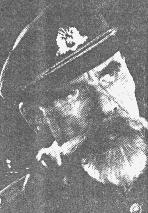Supreme generals
Supreme general (African Lithuanian: "Vyriausiasis karvedys", word "karvedys" being the lituanisation of the word "generolas" ("general"), imposed during the interwar language reform) was a style of the ruler of the short lived state of Pakštuva in Africa. There were two supreme generals, the most famous one being the first one, Povilas Plechavičius, who ruled for most of the time the style existed. The second one, Antanas Audronis, who assumed power after Plechavičius's death, ruled only for four days until Pakštuva was overtaken by the Chinese forces, and thus is rarely mentioned in history books that does not concentrate on the history of the area.
History
By the time Pakštuva became independent from Lithuania and a neutral state (as a requirement imposed by Russia in exchange for stopping the Thunderstorm War in Africa), Povilas Plechavičius was the leader of this area (appointed by the prime minister of Lithuania Antanas Smetona once to quell the Maasai Uprising), which was known then as Naujojo Vilniaus apskritis. As such, with the country becoming independent, Povilas Plechavičius assumed full power. He was reluctant to declare himself a monarch however, because he still thought about a possible reunification with Lithuania once the war was over and if the Lithuania-proper would be liberated; as such, he still seen himself as a subordinate to the king of Lithuania. Therefore, the style of "Supreme general" was adopted. Povilas Plechavičius was already a general, but supreme general was a political post rather than a military rank.
Due to the constant sabotages, terrorist and partisan activity of local blacks and Slavs the "state of emergency" was constant in Pakštuva and thus the powers of Supreme General were increased further. In the 1942, when the Borderland War against China and Ethiopia started and Povilas Plechavičius was killed, Antanas Audronis was the one who assumed the style according to laws. Pakštuva was occupied in several days after that however and Antanas Audronis was executed.
Powers
Supreme General had the following powers:
- The leader of the army, the navy and the the air force (advised by the Supreme military council, that comprised of the highest ranking officers, appointed by the Supreme General himself).
- The leader of the state and its executive branch (advised by the State council (similar to government in other countries), appointed by the Supreme General and confirmed by the parliament).
- The speaker of the parliament (usually represented for this job by another person).
During the state of emergency (which he had the power to declare), the Supreme General had expanded powers, which included:
- The leader of the legislative branch (able to change decitions of most of the courts in the country and impose his own decitions).
- The leader of the faith (able to remove or appoint the leaders of any religious communities that existed in Pakštuva, including Baltic paganism, Islam, Catholicism and Eastern Orthodoxy - Pakštuvan Orthodox Church).
- Ability to issue and cancel laws (these decitions could be vetoed by parliament, however the new law would officially be in power between the time when the Supreme General issues it and the time the parliament vetoes it).
- Ability to change some members of the parliament and judges.
List of the supreme generals
- Povilas Plechavičius (1940 02 12 - 1942 08 25)
- Antanas Audronis (1942 08 25 - 1942 08 29)
This page was created by Abdul-aziz. |
